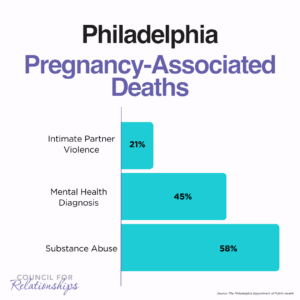Closing the Gap: Perinatal Mental Health Services in North Philadelphia
Perinatal mental health services play a crucial role in supporting expecting and new mothers, offering hope and essential care in communities facing significant challenges. This blog explores the transformative impact of these services, detailing the journey of embedding a Council for Relationships (CFR) Therapist within the Stephen Klein Wellness Center in North Philadelphia and the difference it makes in the lives of those served.

Reported History of Maternal Substance Use, Mental Health Diagnosis and Intimate Partner Violence in Pregnancy-Associated Deaths, 2013-2018
The Importance of Perinatal Mental Health Services
When I saw the job posting, I immediately updated my resume: “Embedded Therapist for Perinatal and New Parent Care.” CFR received funding to offer therapy to expecting and new mothers through Project Home. The role would require working at the Stephen Klein Wellness Center in North Philadelphia, where obstetric care is provided to women.
Addressing the Gap: The Stephen Klein Wellness Center’s Role
The Stephen Klein Wellness Center is a beacon of hope and health in a community lacking comprehensive health care services. Located several blocks west of Temple University and across from a park and community center named in honor of Martin Luther King Jr., the Center provides a wide array of health and wellness services, including primary care, behavioral health, dental care, and a pharmacy.
Put simply, the services offered by the Center are invaluable to neighborhoods of North Philadelphia, where poverty, childbirth-related complications, and deaths are unusually high due to, among numerous other factors, a shortage of services.
Challenges and Solutions in Providing Mental Health Care
We know that mental health conditions are one of the highest risk factors for pregnancy-related death.
As many of us understand, pregnant people and new parents need a lot of support, especially when dealing with issues like not having a stable place to live, poverty, domestic violence, and racism. There was a critical need for mental health services, but hardly any local, affordable, and specialized counseling options were available.
Excitement surrounded this new position. The Stephen Klein Wellness Center, one of those places with genuine concern for the people it serves, had staff that seemed thrilled to offer this service to their mothers finally. They quickly identified clients who were interested in receiving perinatal counseling.
When they offered me the position, I was ecstatic. With my background in social work and an interest in perinatal mental health, it felt like a perfect fit. Nevertheless, I became aware of my privilege and wondered how it would impact the therapy: How could I expect my clients to trust that I understood them?
Council for Relationship and the Launch of a New Position
As we began our work together, nearly every client expressed that trust was generally hard for them. Hearing this, I focused on what every training program will teach you about the most important part of the therapeutic process: the relationship.
Thanks to the trust that the Stephen Klein Wellness Center had instilled in these women from the start, my clients began to break down emotional barriers and be vulnerable with me. I soon viewed our relationships with awe as I experienced these women trusting me. And our relationships grew deeper with time. We built trust, emotional safety, mutual respect, and genuine care.
The truth is that mental health is wrapped up in the realities of managing motherhood. Realities that include limited physical, financial, and emotional resources. It felt important to offer a pause to their sometimes chaotic lives, take a breath, reflect, and listen with full care and attention, even though I could do nothing to fix the real-life problems they came to therapy for.
I grew genuinely fond of my clients, and I could sense that they felt the same way towards me. According to our measures, there was also a significant reduction in depressive symptoms.
An Unexpected Loss & the Long-Term Impact of Perinatal Mental Health Services on Future Relationships
Then, one day, an unexpected email arrived: they had cut the funding for this program. What they initially promised as a one-year program would now end three months early.
The disappointment was palpable after the hard work of various organizations in securing the position and the emotional labor of my clients and me in building these therapeutic relationships. The decision was final despite the advocacy efforts by CFR and the Stephen Klein Wellness Center.
The news shocked, but hardly surprised, us. This is a story you often hear regarding service provision for marginalized communities. Because many in these communities cannot afford the high fees of outpatient therapy, they suffer through things like inadequate care or unexpected termination of treatment.
It pains me that this program has contributed to another lost relationship for these women.
Building Future Relationships Through Effective Outpatient Therapy
Understanding this, CFR graciously stepped in and funded the last three months of the program. Furthermore, they were able to set up the transfer of my clients to staff and interns who could continue seeing them for the foreseeable future at almost no cost.
I am grateful to CFR for having the heart to make this ending smooth. Although it is a happy ending, given the circumstances, I have been sitting with my clients in grief and disappointment as we wrap up the last weeks of our therapy together. They are confronting the anxiety related to changing therapists after having gotten so far with me. I am confronting the loss of relationships that matter to me.
As my clients process the emotions involved with this ending, I have reflected on the meaning behind this position. I am grateful for the experience. I hope my clients can know the value of a therapeutic relationship, their strengths in engaging with it, and how they can apply that to future relationships in and outside therapy.
On a broader level, I am also reflecting on the importance of investing in programs that can help reduce the gap in mental health services for marginalized communities. I hope that individuals in low-income areas will be able to depend on mental health providers to be there for them as long as they need.

CFR Staff Therapist Sonja Spangler, LSW
About CFR Therapist Sonja Spangler
Sonja Spangler, LSW, is a Staff Therapist at Council for Relationships. Contact her to book an individual, couples, or family therapy appointment with Sonja.
Let CFR’s over 85 individual, couples, and family therapy experts help you build thriving relationships and flourishing communities. See our Therapist & Psychiatrist Directory for CFR therapists or psychiatrists near you.
If this is an emergency, please call 911 or contact the National Suicide Prevention Lifeline by dialing 988.
More Mental Health Blogs
Our expert therapists, psychologists, and psychiatrists offer much more to explore! Check out the CFR Expert Voices blog for great mental and emotional health advice and insight. To get first access to our Expert Voices blog, join our mailing list!
Working for a Nonprofit: Why I Work for a Nonprofit Organization
